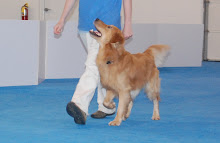I've made a few skill lists for my agility class. One is foundation skills (separate from obstacles, for the most part), obstacle skills, handler/trainer skills, sequence skills, and competition rule/game skills.
There's a few different ways I could use these. I could have them all available for students in class to see me check things off. I could use them after class. I could have some lists available (foundation and obstacle skills?) and some not (handler/trainer skills?). Or I could come up with a different system.
For the most part, in each section there are distinct steps that can be checked off when accomplished and this might help students see how much there is to go. But I odn't know if this will still get enough foundation strength. Maybe if I am telling them exactly what I need to see before they proceed? I do this some of the time, but I don't think I do this enough?
For those of you in class or pretending to be in class or who have been in class before... would a check list that you and your instructor look at be helpful? Will this possibly help us stay on track?
And then...I want to use dates on there just so I can see how fast teams progress on average. I really really want this in my pet classes. It will make things easier to keep track of on weeks where I'm not there and have to leave lesson plans and it might help me see where we have weak lesson plans.
Griffin needs more lesson plans! Our focus this week is duration stays. Stay tuned...





4 comments:
I freaking LOVE checklists. I love charts. My husband, however, hates them. So... they may help some of your students, and not others.
I love doing foundation work, but I'm one of those annoying students that won't do something unless I understand WHY. Maybe handouts that explain how this skill contributes to the bigger picture would be in order?
Or... (maybe this is what you're thinking) make checklists of each smaller skill on the way to the bigger one, so that something like "a-frame" is broken down into 8 or whatever foundation skills, so the progression is clearly obvious... also so that those of us who forge ahead without instruction don't miss *too* much along the way.
If that all makes sense?
Hmmmphh... I've not done handouts... in my basic class it's all online and they can only view what they've progressed to. But that's a lot of work to maintain so I'm not sure I'd want to do that... and because it's an ongoing self paced class I'd have to pass out everything at the beginning... but we could do handouts.... We talk about why skills are important and what they're building to.
Each smaller skill has a part and aframe really did have 8 parts! (...note..this was on the "obstacle list" ... the "skill list" had 'contact behavior' and all those parts...)
Thanks for all the thoughts and comments!
I would love a check list! I make them up for my own dogs to help keep me on track. The downside of a checklist is that people, including me, will skip ahead and move on to the next thing. This might be ok for some people, but others will still skip ahead before they are ready. And many won't even know how to do the next step properly and will end up screwing it all up. But then again there's a good chance your students are already doing that so maybe the checklist will actually slow them down?
I think you should go for it. You won't know how it helps or not until you try it!
I also like the idea of a checklist. When they have more dogs, I bet they'd appreciate having it to look back on.
One issue, and it would depend on the type of students you have, is whether or not they'd argue over certain points with you. I don't know what's specifically on the checklist, but for example, if one foundation skill is a cross on the flat and the handler is doing it incorrectly, they might argue with you and say they're doing it fine just so they could progress.
Hopefully you don't have any students like that though! And personally, I would love a checklist. I think its a great idea.
Post a Comment